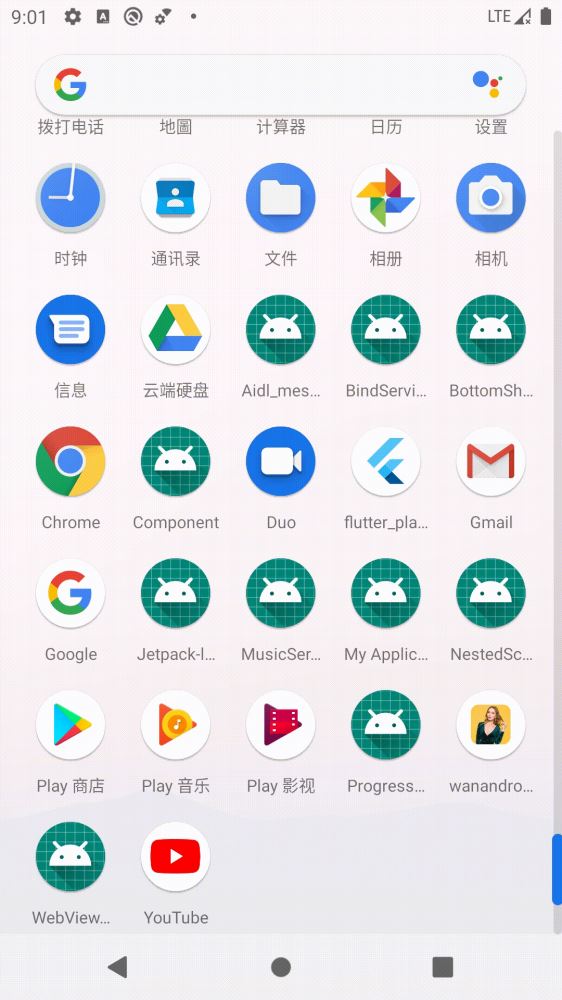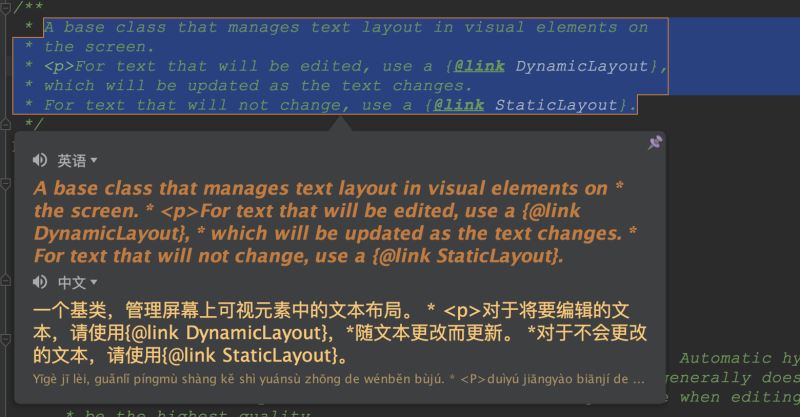Android 自定義 View 中使用 Spannable的實(shí)例詳解
我們都知道 Android 中使用 Spannable 可以實(shí)現(xiàn) TextView 富文本的顯示,但是在自定義控件中如何使用 Spannable 繪制不同樣式的文字呢?

例如這種效果,標(biāo)題中的 分?jǐn)?shù)字61 是粗體,分 是常規(guī)字體,并且相對(duì)于 61 更小些。第一反應(yīng)可能是使用 SpannableString.setSpan() 設(shè)置 RelativeSizeSpan, 然后在 onDraw() 中進(jìn)行繪制,事實(shí)是這樣實(shí)現(xiàn)是沒(méi)有效果的,因?yàn)?onDraw() 中只能獲取到 SpannableString 中的內(nèi)容,拿不到 Span.
那如何在自定義View 中使用 Spannable 呢? 答案就是系統(tǒng)提供的 Layout 類,
/** * A base class that manages text layout in visual elements on * the screen. * <p>For text that will be edited, use a {@link DynamicLayout}, * which will be updated as the text changes. * For text that will not change, use a {@link StaticLayout}. */public abstract class Layout { }


可以看到 Layout 是一個(gè)抽象類,有三個(gè)子類,可以實(shí)現(xiàn)一些自動(dòng)換行的顯示效果。
BoringLayout DynamicLayout StaticLayout實(shí)現(xiàn)代碼
1. 定義自定義屬性
<?xml version='1.0' encoding='utf-8'?><resources> <declare-styleable name='ArcProgressView'> <attr name='arcBackgroundColor' format='color' /> <attr name='arcProgressColor' format='color' /> <attr name='arcSubTitleColor' format='color' /> <attr name='arcStrokeWidth' format='dimension' /> <attr name='arcTitleTextSize' format='dimension' /> <attr name='arcSubTitleTextSize' format='dimension' /> <attr name='arcProgress' format='float' /> <attr name='arcTitleNumber' format='integer' /> </declare-styleable></resources>
2. 繼承 View, 在 onDraw() 中繪制
public class ArcProgressView extends View { private int arcBackgroundColor; // 圓弧背景顏色 private int arcProgressColor; // 圓弧進(jìn)度顏色 private int arcSubTitleColor; // 副標(biāo)題顏色 private float arcStrokeWidth; // 圓弧線的厚度 private float arcTitleTextSize; // 標(biāo)題文字大小 private float arcSubTitleTextSize; // 副標(biāo)題文字大小 private float arcProgress; // 進(jìn)度 private int arcTitleNumber; // 值 private Paint paint; private float centerX; private float centerY; private float radius; // 半徑 private RectF rectF; private int startAngle = 135; private int sweepAngle = 270; private String subTitle = '1月份'; private SpannableString spannableString; private TextPaint textPaint; private RelativeSizeSpan relativeSizeSpan; private DynamicLayout dynamicLayout; private String text = '11分'; private StyleSpan styleSpan; private float curProgress; // 當(dāng)前進(jìn)度 private int curNumber; public ArcProgressView(Context context) { this(context, null); } public ArcProgressView(Context context, @Nullable AttributeSet attrs) { this(context, attrs, 0); } public ArcProgressView(Context context, @Nullable AttributeSet attrs, int defStyleAttr) { super(context, attrs, defStyleAttr); readAttrs(context, attrs); init(context); } private void readAttrs(Context context, AttributeSet attributeSet) { TypedArray typedArray = context.obtainStyledAttributes(attributeSet, R.styleable.ArcProgressView); arcBackgroundColor = typedArray.getColor(R.styleable.ArcProgressView_arcBackgroundColor, 0x1c979797); arcProgressColor = typedArray.getColor(R.styleable.ArcProgressView_arcProgressColor, 0xff3372FF); arcSubTitleColor = typedArray.getColor(R.styleable.ArcProgressView_arcSubTitleColor, 0x66000000); arcStrokeWidth = typedArray.getDimensionPixelSize(R.styleable.ArcProgressView_arcStrokeWidth, dp2px(5)); arcTitleTextSize = typedArray.getDimensionPixelSize(R.styleable.ArcProgressView_arcTitleTextSize, dp2px(30)); arcSubTitleTextSize = typedArray.getDimensionPixelSize(R.styleable.ArcProgressView_arcSubTitleTextSize, dp2px(14)); arcProgress = typedArray.getFloat(R.styleable.ArcProgressView_arcProgress, 1.0f); arcTitleNumber = typedArray.getInt(R.styleable.ArcProgressView_arcTitleNumber, 100); typedArray.recycle(); } private void init(Context context) { paint = new Paint(Paint.ANTI_ALIAS_FLAG); paint.setStrokeCap(Paint.Cap.ROUND); relativeSizeSpan = new RelativeSizeSpan(0.6f); styleSpan = new StyleSpan(android.graphics.Typeface.BOLD); textPaint = new TextPaint(TextPaint.ANTI_ALIAS_FLAG); textPaint.setColor(arcProgressColor);// textPaint.setTextAlign(Paint.Align.CENTER); // 設(shè)置該屬性導(dǎo)致文字間有間隔 textPaint.setTextSize(sp2px(22)); } @Override protected void onSizeChanged(int w, int h, int oldw, int oldh) { super.onSizeChanged(w, h, oldw, oldh); centerX = w / 2f; centerY = h / 2f; radius = (Math.min(w, h) - arcStrokeWidth) / 2f; rectF = new RectF(-radius, -radius, radius, radius); } @Override protected void onMeasure(int widthMeasureSpec, int heightMeasureSpec) { super.onMeasure(widthMeasureSpec, heightMeasureSpec); int width = getMeasuredSize(widthMeasureSpec, dp2px(100)); int height = getMeasuredSize(heightMeasureSpec, dp2px(100)); setMeasuredDimension(width, height); } @Override protected void onDraw(Canvas canvas) { super.onDraw(canvas); // 繪制圓弧和進(jìn)度 drawArc(canvas); // 繪制文字 title drawTitleText(canvas); // 繪制文字副標(biāo)題 drawSubTitle(canvas); } @Override protected void onAttachedToWindow() { super.onAttachedToWindow(); startAnimation(); } private void startAnimation() { ValueAnimator progressAnimator = ValueAnimator.ofFloat(0f, arcProgress); ValueAnimator numberAnimator = ValueAnimator.ofInt(0, arcTitleNumber); progressAnimator.addUpdateListener(new ValueAnimator.AnimatorUpdateListener() { @Override public void onAnimationUpdate(ValueAnimator animation) { curProgress = (float) animation.getAnimatedValue(); invalidate(); } }); numberAnimator.addUpdateListener(new ValueAnimator.AnimatorUpdateListener() { @Override public void onAnimationUpdate(ValueAnimator animation) { curNumber = (int) animation.getAnimatedValue(); text = curNumber + '分'; } }); AnimatorSet animatorSet = new AnimatorSet(); animatorSet.playTogether(progressAnimator, numberAnimator); animatorSet.setDuration(700); animatorSet.setInterpolator(new LinearInterpolator()); animatorSet.start(); } private void drawSubTitle(Canvas canvas) { canvas.save(); canvas.translate(centerX, centerY); paint.setTextSize(arcSubTitleTextSize); paint.setTextAlign(Paint.Align.CENTER); paint.setColor(arcSubTitleColor); paint.setStyle(Paint.Style.FILL); paint.setStrokeWidth(0); canvas.drawText(subTitle, 0, 60, paint); canvas.restore(); } private void drawArc(Canvas canvas) { canvas.save(); canvas.translate(centerX, centerY); paint.setColor(arcBackgroundColor); paint.setStrokeWidth(arcStrokeWidth); paint.setStyle(Paint.Style.STROKE); canvas.drawArc(rectF, startAngle, sweepAngle, false, paint); paint.setColor(arcProgressColor); canvas.drawArc(rectF, startAngle, sweepAngle * curProgress, false, paint); canvas.restore(); } private void drawTitleText(Canvas canvas) { canvas.save(); textPaint.setTextSize(arcTitleTextSize); float textWidth = textPaint.measureText(text); // 文字寬度 float textHeight = -textPaint.ascent() + textPaint.descent(); // 文字高度 // 由于 StaticLayout 繪制文字時(shí),默認(rèn)畫在Canvas的(0,0)點(diǎn)位置,所以居中繪制居中位置,需要將畫布 translate到中間位置。 canvas.translate(centerX - textWidth * 2 / 5f, centerY - textHeight * 2 / 3f); spannableString = SpannableString.valueOf(text); spannableString.setSpan(styleSpan, 0, text.length() - 1, Spanned.SPAN_INCLUSIVE_EXCLUSIVE); spannableString.setSpan(relativeSizeSpan, text.length() - 1, text.length(), Spannable.SPAN_EXCLUSIVE_EXCLUSIVE); dynamicLayout = new DynamicLayout(spannableString, textPaint, getWidth(), Layout.Alignment.ALIGN_NORMAL, 0, 0, false); dynamicLayout.draw(canvas); canvas.restore(); } /** * 對(duì)外提供方法,設(shè)置進(jìn)度 * * @param percent */ public void setArcProgress(float percent) { this.curProgress = percent; invalidate(); } private int getMeasuredSize(int measureSpec, int defvalue) { int mode = MeasureSpec.getMode(measureSpec); int size = MeasureSpec.getSize(measureSpec); if (mode == MeasureSpec.EXACTLY) { return size; } return Math.min(size, defvalue); } private int dp2px(int dp) { return (int) TypedValue.applyDimension(TypedValue.COMPLEX_UNIT_DIP, dp, getResources().getDisplayMetrics()); } private int sp2px(int sp) { return (int) TypedValue.applyDimension(TypedValue.COMPLEX_UNIT_SP, sp, getResources().getDisplayMetrics()); }}
3. 在布局中引用
<com.xing.bottomsheetsample.ArcProgressView android:layout_width='match_parent' android:layout_height='100dp' android:layout_marginTop='20dp' app:arcProgress='0.6' app:arcSubTitleTextSize='14sp' app:arcTitleNumber='61' app:arcTitleTextSize='28sp' />
總結(jié)
到此這篇關(guān)于Android 自定義 View 中使用 Spannable的文章就介紹到這了,更多相關(guān)Android 使用 Spannable內(nèi)容請(qǐng)搜索好吧啦網(wǎng)以前的文章或繼續(xù)瀏覽下面的相關(guān)文章希望大家以后多多支持好吧啦網(wǎng)!
相關(guān)文章:
1. xml創(chuàng)建節(jié)點(diǎn)(根節(jié)點(diǎn)、子節(jié)點(diǎn))2. ASP.NET MVC使用jQuery ui的progressbar實(shí)現(xiàn)進(jìn)度條3. python實(shí)現(xiàn)合并兩個(gè)有序列表的示例代碼4. 淺談Python中文件夾和python package包的區(qū)別5. Python中常見(jiàn)的數(shù)制轉(zhuǎn)換有哪些6. java 實(shí)現(xiàn)Comparable接口排序,升序、降序、倒敘7. Python selenium模擬網(wǎng)頁(yè)點(diǎn)擊爬蟲交管12123違章數(shù)據(jù)8. Python基礎(chǔ)之numpy庫(kù)的使用9. Opencv Python實(shí)現(xiàn)兩幅圖像匹配10. 關(guān)于Python Socket編程的要點(diǎn)詳解

 網(wǎng)公網(wǎng)安備
網(wǎng)公網(wǎng)安備